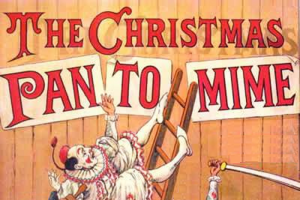Notícies
-
Beques Anglès curs 26-27
CONVOCATÒRIA JA OBERTA! · 30 beques anglès alumnes 3r d’ESO
-
RENOVACIÓ 2026 - Crèdit Fundae Empreses
Bonifica la FORMACIÓ D'IDIOMES de la teva EMPRESA!
-
Cursos SEMIINTENSIUS - De febrer a juny
Per als nivells/cicles B2 First i C1 Advanced
January article
Dilluns, 1 de Gener del 2018He’s behind you! The History of the British Pantomine.
Pantomimes have become quintessentially British: as British as Earl Grey tea or a good Indian curry. They are often seen as something quaint, and although utterly British, their origins lie in warmer climes. The pantomime developed from the Italian street theatre of the commedia dell’arte in the 16th Century, with comedic moments, stock characters and great physicality. The phrase means ‘comedy of the artists’ and these improvised performances took place outside in Italian streets and marketplaces. Commedia was a versatile, popular and influential art form.
Distinctive masks enabled audiences to recognise characters immediately; they also allowed actors to make topical and risqué jokes without fear of being recognised. But how did pantomime work its way into British theatre? Think of the combined power of television and the internet and you start to understand the theatre’s reach and influence in the 18th century. Thousands of people, from aristocrats to apprentices, patronised theatres in London every night; by mid-century, theatres were being built in towns and cities across Britain. Theatre was the place where everyone came to be entertained; and many of the plays spectators enjoyed were stories about what it meant to be British.
A rough, uneducated man called John Rich played a key role in the emergence of pantomime. Rich was a dancer, acrobat and mime artist and during the 1720s and what he created was a new kind of entertainment. His pantomimes cleverly fused commedia, spectacle, music, ballet and myth but also attracted huge controversy. Critics bitterly attacked pantomimes, complaining that this foreign entertainment threatened the downfall of Shakespeare and the death of serious theatre. David Garrick, the great 18th century actor-manager, was quick to join these critical blasts against his theatrical rival, Rich. But he also realized the commercial potential of this emerging form. "If they won’t come to Lear and Hamlet", he said, "I must give them Harlequin".
But how could Garrick cash in on the craze and still maintain his position as the defender of 'legitimate' theatre? His tactic was to set about changing pantomime’s cultural identity, partly by limiting pantomimes to the Christmas season. Pantomimes became associated with the fun and frivolity of the holiday season rather than being denounced as a threat. In doing so, of course, Garrick created a convention which has survived to this day.
Across the UK, children and adults come to their local theatre to be dazzled and thrilled by the spectacle and the fun of pantomime. But what is it that still attracts us - young and old - to this bizarre medley of fairy tale, dance, jokes and song? The story of pantomime is a tale of dragons and serpents. It features men dressed as women, and women masquerading as young men. Pantomime presents a tale of good and evil, where hope triumphs over adversity after danger and virtual despair. Its unique fusion of eccentricity, ambiguity and absurdity has much to tell us about our national identity. Christmas, for many of us, would not be Christmas without pantomime; and pantomime was the place we first discovered the magic of theatre.
Somewhere between 1860 and 1870 the theatres decided the pantomimes needed to be tightened up, and needed to be modernised. Although pantomime players had become stars, now it was felt that established stars from British Music Hall would be a better attraction. Primarily aimed at children, the managements were also aware it was the adults who bought the tickets. The adults would nightly visit the Music Halls top see their favourite performers. The invasion of Music Hall was set to begin. This, above all created the biggest change and transformation to the style of pantomime, and leaves its greatest influence on what we see in pantomime today.
Many modern pantomimes use popular artists to promote them, and the story is often adapted to allow the star to showcase their well-known act, even when such a spot has little relation to the plot. Think X Factor finalists, Strictly Come Dancing judges and former soap opera stars. This is big business for theatres and a successful Christmas panto can fund the theatre for the upcoming year as it draws in crowds and thousands of pounds.
Pantomime is popular family entertainment. The audience has to work almost as hard as the performers, whether it´s joining in songs, assisting in conjuring tricks, booing the villain and warning the hero with 'he's behind you!’. Above all, it has the capacity to offer a child its first magical encounter with live theatre - if you missed our production of Beauty and the Beast, be sure to check out the YouTube recording here.










 Tel. 93 655 05 58
Tel. 93 655 05 58 Enviar WhatsApp
Enviar WhatsApp



![[...]](https://www.cambridgeschool.com/xtra/imgs/loading.gif)